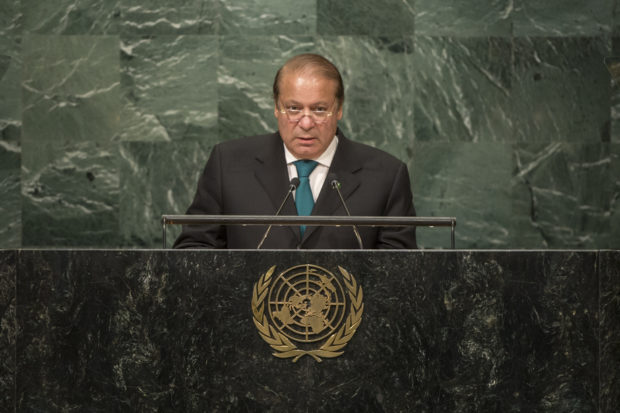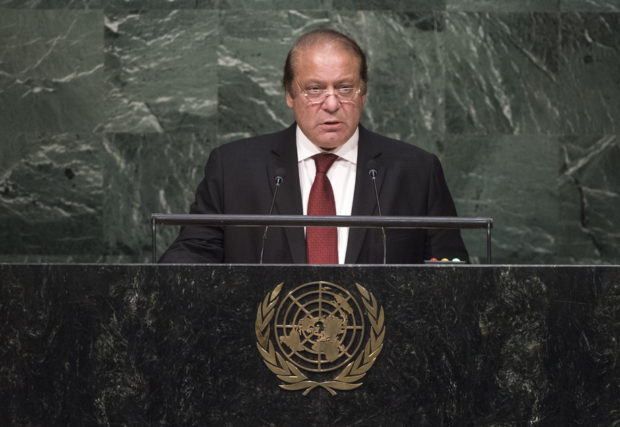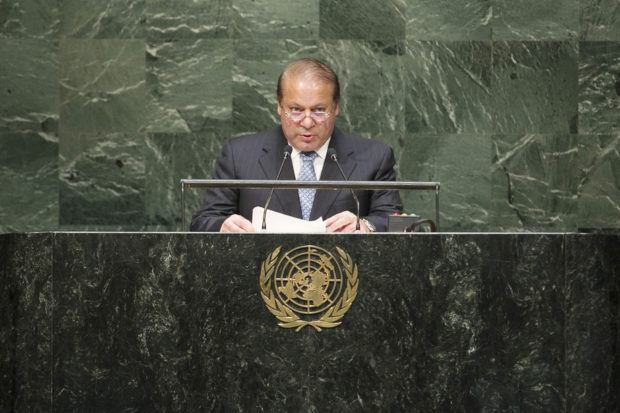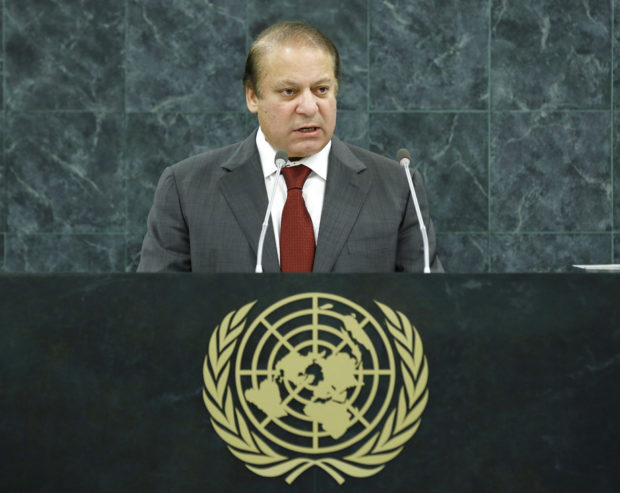Nawaz Sharif: A spokesman of Kashmir freedom movement in UNGA
A special piece for Dispatch News Desk (DND) by Anna Ghafarov
Kashmir is core issue for Prime Minister of Pakistan Mian Nawaz Sharif whenever he has an opportunity to raise brutality of Indian forces against Kashmiris being committed in Indian occupied Kashmir.
Sharif addressed fourth time last night at United Nations General Assembly (UNGA) as Prime Minister of Pakistan since he took over the charge in 2013. One can read is previous speeches at UNGA to understand how much he cares about Kashmir issue.
Facing harsh environments at home due to an on-going political moment that targets to destabilise his government, Sharif was again hard hitting and outspoken when matters came about his arch rival and neighbour India with whom Pakistan had gone for wars in 1965 and 1971.
Important points of last four speeches of Sharif are reproduced here to give an idea how he thinks about Kashmir as core point of foreign policy of his government.
21 September 2016
MUHAMMAD NAWAZ SHARIF, Prime Minister of Pakistan, said that his country’s successful implementation of the 2030 Agenda hinged on internal peace and stability. However, tens of thousands of Pakistani citizens had been killed or injured in attacks by terrorist networks, funded by external sources. Despite those losses of human life, his country had successfully pursued targeted operations against terrorists, enabling Pakistan to “turn the tide against terrorism”.
On a global scale, the same efforts to counter terrorism should be conducted multilaterally and “not by the passage of laws with extraterritorial application targeted against certain countries”, he said, adding that the war in neighbouring Afghanistan had presented momentous economic and security challenges to his country, which hosted 3 million Afghan refugees. He iterated that the only path to a lasting peace, and for those refugees to return home, was a dialogue between the Government in Kabul and the Afghan Taliban.
Turning to his country’s conflict with India, a normalization of relations could only be realized with a resolution of the Kashmir dispute. India’s occupation forces continued to repress Kashmiris. His Government would share with the Secretary-General a dossier containing detailed information and evidence of gross and systematic violations of human rights committed by those forces. Pakistan supported the Kashmiri people’s demand for self-determination, as promised to them by several Security Council resolutions. The United Nations should work to demilitarize Jammu and Kashmir in dialogue with India, Pakistan and the Kashmiri people. Pakistan was not engaged in an arms race with India, he said, but added: “We cannot ignore our neighbour’s unprecedented arms build-up and will take whatever measures necessary to maintain credible deterrence.”
30 September 2015 (70th Session)
Statement Summary:
MUHAMMAD NAWAZ SHARIF, Prime Minister of Pakistan, said peacekeeping had been one of the key responsibilities of the United Nations and Pakistan was proud of its historic and current role as a major troop contributor. It viewed its participation as its obligation to uphold international peace and security. Pakistan was a primary victim of terrorism and its operation, Zarb-e-Azb, was the largest anti-terrorism campaign against terrorists anywhere. It involved more than 180,000 security forces and was complemented by an all-inclusive National Action Plan. Terrorism could not be defeated unless its underlying causes, including poverty and ignorance, were addressed. The spread of terrorism across the Middle East was an unprecedented security challenge. The tragedy of Palestine had intensified and the accepted avenue for peace between Palestine and Israel, a two-State solution, appeared further away today because of the intransigent stance of the occupying Power. Yet the Palestinian flag was being raised just outside this hall and Pakistan hoped it was just the first step. He looked forward to welcoming Palestine as a full member of the United Nations.
Pakistan welcomed the comprehensive nuclear agreement reached between Iran and the P5+1 (China, France, Russian Federation, United Kingdom, United States and Germany), he said. Pakistan-Afghan relations had undergone a positive transformation after the advent of the National Unity Government in Kabul. Pakistan would continue to help resume the stalled dialogue process but could do so only if it received the required cooperation from the Afghan Government. Pakistan was encouraged that the international community, including the major powers, desired the continuation of the peace process in Afghanistan. It welcomed China’s proactive role in promoting peace and prosperity in Afghanistan and the region and its vision of “One Belt, One Road.”
Development was the Pakistan Government’s key priority, he said. When the Composite Dialogue was launched with India in 1997, the two countries agreed it would encompass two principal issues: Kashmir and peace and security. The urgency of addressing these two issues was even more compelling today. Since 1947, the Kashmir dispute had remained resolved and Security Council resolutions were not implemented. “Three generations of Kashmiris have only seen broken promises and brutal oppression. Over 100,000 have died in their struggle for self-determination,” he said. “This is the most persistent failure of the United Nations.”
He said that President Sharif had said one of his first priorities after assuming office for the third time in June 2013 was to normalize relations with India. He had reached out to the Indian leadership to emphasize that their common enemy was poverty and underdevelopment. Yet ceasefire violations along the Line of Control and the Working Boundary were intensifying. He wanted to use this day to propose a new peace initiative with India. Its first element was that Pakistan and India would formalize and respect the 2003 understanding for a complete ceasefire on the Line of Control in Kashmir. Secondly, Pakistan and India would reaffirm they would not use, or threaten to use, force under any circumstances. Thirdly, steps would be taken to demilitarize Kashmir. Lastly, Pakistan and India would agree to an unconditional mutual withdrawal from Siachen Glacier, the world’s highest battleground.
26 September 2014 (69th Session)
Statement Summary:
MUHAMMAD NAWAZ SHARIF, Prime Minister of Pakistan, said that extreme weather was disrupting world economies, particularly in developing countries. Recent monsoon floods in his country had killed hundreds of people, displaced millions, and destroyed and damaged homes, livelihoods, infrastructure, cattle and crops. The Government was mobilizing all its resources and ingenuity to provide relief and ensure recovery. He called on the international community to intensify its efforts to move from awareness to commitments on actions addressing climate change.
Pakistan had launched its “Vision 2025”, which put people first, he said. In the coming decade, it would develop human and social capital through investment in education, health and gender parity; stimulate sustained economic growth; prioritize energy, water and food security; modernize the public sector; and encourage sector-led entrepreneurship. His Government would also pursue a policy of constructive engagement and remain engaged in the dialogue process needed to settle disputes and build economic and trade relations.
More than six decades ago the United Nations had passed resolutions to hold a plebiscite in Jammu and Kashmir, he said. However, the people there were still waiting for the fulfilment of that promise. Many generations of Kashmiris had lived under occupation, accompanied by violence and abuse of their fundamental rights. It was the responsibility of the international community to resolve the issue of Jammu and Kashmir, he underscored, reaffirming Pakistan’s readiness to work for a resolution of this problem through negotiations.
Afghanistan was going through momentous security, political and economic transitions, he continued, voicing hope that these landmark processes would result in a stronger, more stable and unified country. Condemning terrorism in all its forms and manifestations, he called on the United Nations to facilitate a just and lasting solution of the Palestinian issue.
As a responsible nuclear weapon State, he said, Pakistan would continue to support the objectives of nuclear disarmament and non-proliferation, and pursue a policy of nuclear restraint and credible minimum deterrence. To promote stability, it was prepared to explore new confidence-building measures, he added. He also said that, in regard to the reform of the Security Council, there should be no new permanent seats on it; instead, the body should become more representative, equitable, accountable and transparent.
27 September 2013 (68th Session)
Statement Summary:
MUHAMMAD NAWAZ SHARIF, Prime Minister of Pakistan, said he felt exonerated after long years of “exile, exclusion and State oppression”. Pakistan could now boast a strong parliament, an independent judiciary, a free media and a vibrant civil society, but there was no room for complacency. Democracy needed constant vigilance and strong institutions.
He ardently supported the United Nations, calling for reform in the interests of all Members. The Security Council needed to be equipped to face a dynamic future and the role and authority of the General Assembly also needed restoration and revitalization. The latter body’s influence had improved for responding to peace and security, development and climate change issues. The United Nations was vital to resolving “festering disputes”, like Jammu and Kashmir, which was first presented to the Security Council in 1948. Kashmiris had the right to self-determination and to decide their own futures peacefully, in line with Security Council resolutions. He looked forward to re-engaging with India, highlighting his plan to meet India’s Prime Minister, Manmohan Singh in New York.
He said he had recently met President Hâmid Karzai of Afghanistan and expressed support for an inclusive, Afghan-led, Afghan-owned peace process, aimed at national reconciliation. He would not interfere in Afghanistan’s internal politics and said Pakistan’s commitment to Afghans was clear in its continued hosting of millions of refugees. Turning to the Middle East, he looked forward to Palestine becoming a full Member State of the United Nations and expressed solidarity with the Palestinian people. Syria’s Government and opposition needed to move to the negotiating table in Geneva to prepare for national reconciliation and political transition, he said, condemning the use of chemical weapons and welcoming the recent Security Council resolution. Pakistan would continue its policy of Credible Minimum Deterrence on nuclear weapons and his position on the Fissile Material Treaty was based on strategic stability in South Asia.
He condemned terrorism, citing the 40,000 Pakistanis who died through terrorism, and the colossal damage done to social and physical infrastructure. He would use any means to combat terrorism but preferred dialogue. Winning hearts and minds, particularly of the youth, was important. Combating terrorism required adherence to international law and armed drone strikes violated Pakistan’s territorial integrity. He added that terrorism had no religion, so profiling of Muslims as terrorists was the “most insidious form of contemporary racism”. Stereotyping had to stop.
He said the post-2015 development agenda should set benchmarks on poverty alleviation, sustainable development and social inclusion, and address climate change. Pakistan had the natural resources to drive an economic revolution but challenges like overcoming the volatile security environment, correcting structural imbalances in the economy and ending energy shortages needed tackling. He did not seek more international aid, instead preferring better trade, market access, investment and partnerships. Education was vital to driving socioeconomic development and a new National Health Service would improve that sector. Women’s participation and rights needed to expand, while investment was needed in education and skills for the youth, who made up 63 per cent of Pakistan’s population, and tolerance was needed for minorities. Due to Pakistan’s susceptibility to natural disasters, he had launched a ten year National Disaster Risk Reduction Policy, characterized by its proactive and anticipatory approach.









